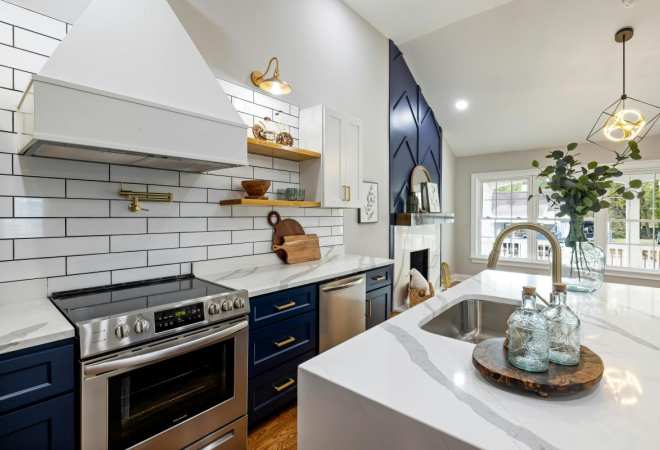You’ve finally found the one — your dream home, that is. It’s you and your spouse’s first home together, so it has to be remarkable. Before you dive headfirst into renovation, it pays to know the common pitfalls that could turn your house into a stress-inducing nightmare.
Learn about these seven mistakes and how to avoid them.
1. Not Having a Clear Vision
What do you want to see after renovating? Detailing your vision gives contractors a clearer picture of the job, allowing them to create a detailed quote. Once you start a project, making changes halfway through can be costly, so setting expectations before starting is essential.
Look for design ideas in magazines, websites and social media, such as Pinterest. Consider the colors, furniture size, placement and decor. The more you envision your dream home, the better you’ll be prepared for decision-making.
Additionally, inspect your home so as not to overlook problems. Check your garage door for safety issues and security concerns, such as torsion springs that need replacing. It’s better to have it fixed now rather than later to avoid costly expenses.
2. Choosing a Cheaper Quote
You will get various estimates when meeting different contractors. Some may be high, while others may be low. A newlywed couple just starting their life together might look at a low quote and think they got lucky, but that’s not always true. More affordable quotes mean they may have left something off to make it cheaper. It could also mean lower-quality labor or materials.
Talk to at least two contractors to ensure you get a fair price for your requested services. Make sure the bids include information about the work scope. Generally, the contractor will also obtain the required building permits.
3. Not Hiring an Interior Designer
Couples may be tempted to D.I.Y. to save costs. However, over 30% of all jobs for home remodelers come from failed D.I.Y. projects. Hiring an interior designer is your best bet to ensure your vision comes to life. Ensuring your renovations are completed according to plan avoids costly errors, such as purchasing furniture that doesn’t fit your home's aesthetic. It’s an investment worth splurging on.

4. Overlooking Individual Preferences
If you’re new to living under one roof, chances are you’ve had discussions about your desired decor. However, it can be challenging to blend your preferences, especially if you have entirely different styles. Here’s how not to overlook your and your partner’s decor interests:
- Respect each other: Commit to valuing each other’s opinions and lend equal weight to both interests. You can start with items you both love and streamline from there.
- Make your wish lists: Maybe you want a walk-in closet, and your spouse wants a reading nook. Write everything down.
- Agree to blend styles in common areas: Shared spaces like your bedroom, living room and dining area should reflect both of you. For instance, if you’re into minimalism and your partner is traditional, mix classic furniture with neutral-colored walls.
5. Underestimating the Time Required
Newlyweds often fail to accurately predict how long renovations will take, leading to stress. Ask the contractor for the estimated timeline so you can plan. For instance, a kitchen renovation may entail replacing countertops or adding an accent backsplash. A professional contractor will provide a list of materials and estimated completion time.
However, home improvement projects are prone to delays due to changes in material availability and hidden issues that need urgent attention. An excellent contractor must be flexible throughout the process.
6. No Contracts Signed
Some states only require a written contract for home improvement projects over a certain amount, but this doesn’t mean agreements below that number should not be written. Get every agreement in writing, even small tasks. The contract must include everything, such as specific materials, labor details and finishes.
7. Ignoring Hidden Costs
Home renovations are exciting for homeowners, especially for newlyweds. However, there’s always something unexpected that will arise. Even though you’ve set a reasonable budget, chances are you’ll incur additional costs. Here are some possible causes:
- Permits: The price can range from $50 for minor upgrades to $2,000 for major remodels.
- Remediation: You may discover significant damage or pest infestation in your home. Problems uncovered during renovation might entail additional expenses.
- Changes in plans: You or your partner may have changes midway.
- Child or pet care: If you have a kid or a pet, you might need to hire a nanny or pet sitter throughout your renovation.
- Eating out: If your renovation project includes kitchen remodeling, you’ll likely eat out daily.
What Comes First in Renovations?
What’s the best step-by-step process for tackling a home renovation? Here’s a simple guide to help you plan. However, what works for others might not work for you. It’s best to consult your contractor for their recommendations.
- Planning and designing
- Demolition
- Rebuilding
- Mechanical, plumbing and electrical projects
- Walls
- Flooring
- Cabinets
- Appliances and furniture
- Final touches, such as home decor and accessories
Enjoy Your First New Home
Avoid these mistakes to make renovations more enjoyable and manageable. It’s your first home, so don’t hesitate to hire professionals who could make your dream house a reality. Soon enough, you and your partner can have the best place to build your lives together.

Author Bio: Oscar Collins is the editor-in-chief at Modded, where he writes about a broad spectrum of topics. Follow him on Twitter @TModded for frequent updates on his work.
are you a bride or groom-to-be?
We'd love to plan with you on weddingday-online.com. Let's get started!
are you a wedding extraordinaire?
Join WeddingDay Magazine in inspiring brides by partnering with us! See how here.








Join the conversation
Log in or register to post comments